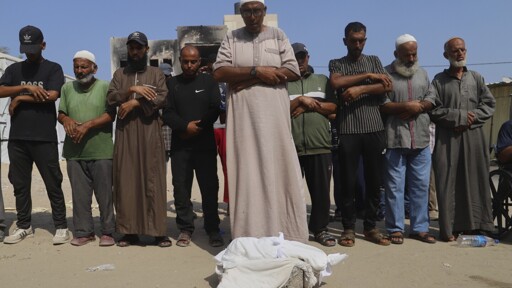By SAMY MAGDY and MARIAM DAGGA Updated 9:15 PM EDT, July 26, 2025
KHAN YOUNIS, Gaza Strip (AP) — A mother pressed a final kiss to what remained of her 5-month-old daughter and wept. Esraa Abu Halib’s baby now weighed less than when she was born.
On a sunny street in shattered Gaza, the bundle containing Zainab Abu Halib represented the latest death from starvation after 21 months of war and Israeli restrictions on aid.
The baby was brought to the pediatric department of Nasser Hospital on Friday. She was already dead. A worker at the morgue carefully removed her Mickey Mouse-printed shirt, pulling it over her sunken, open eyes. He pulled up the hems of her pants to show her knobby knees. His thumb was wider than her ankle. He could count the bones of her chest



The problem in Gaza is not a lack of money; or even a lack of food. It is the regional superpower using its overwhelming military support to block food entry and distribution. While explicitly blocking all organizations with a history and track record of successful aid provisioning in challenging war zones. Then replacing it with their own potenkin aid agency as members of their senior leadership talk openly about using starvation as a weapon of war.
Even in the most charitable reading, donations like this do nothing to help on net. Assuming it is not an outright scam, you are just giving this one family some of the limited supply of food in Gaza. That means that you are depriving someone else in Gaza that food; because you did not actually introduce more food; and, one way or another, that food was going to get eaten.
Adding more money to the equation does help fund the gangs running the food black market. I don’t mean to imply that such gangs are responsible for the crisis (they are not), or even that they are inherently bad (in a well run system, profit oriented local groups providing last mile distribution can be helpful). But, in this case, they are at best neutral.
deleted by creator